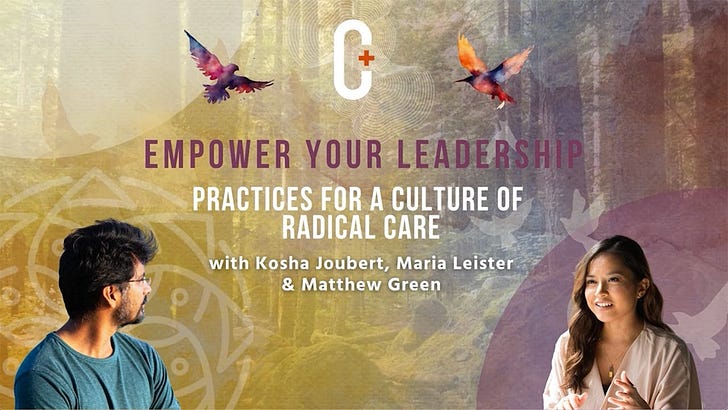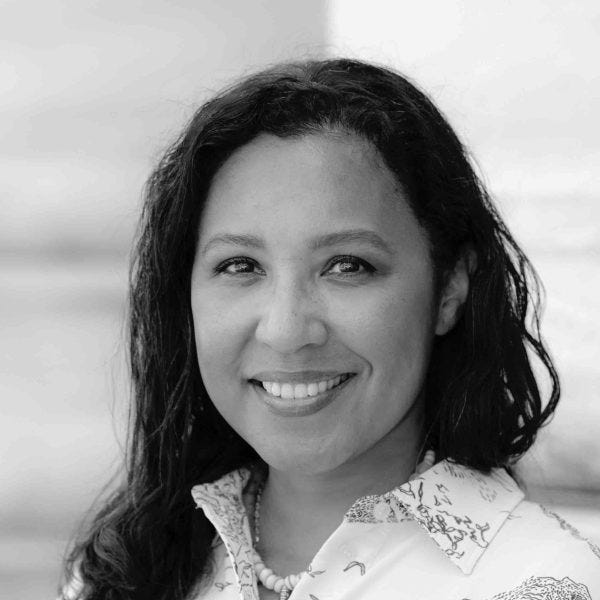Twelve Qualities of a 'Trauma-Informed' Leader
A new course in creating cultures of radical care.
If you liked reading this, feel free to click the ❤️ button on this post so more people can discover it on Substack 🙏
Resonant World now has more than 1,300 subscribers, including almost 50 paying supporters. Paid subscribers automatically become members of the Resonance Council, a space dedicated to deeper exploration, where I share in more depth about my own process, in writing and via audio, and invite resonance in return. Any form of support — liking; commenting; sharing, or subscribing — helps this work reach more people, and serve the global movement to integrate individual, inter-generational and collective trauma. Thank you!
The Resonant Man: Summer Dialogues
Jacob Kishere and I are hosting the second men’s circle in our Resonant Man Initiative on Sunday, July 14.
Sessions will include a space-opening meditation, and a combination of big-group and small-group dialogue.
The free Zoom sessions start at 7pm BST (11am PST / 2pm EST) and last 90 minutes.
Sunday, July 14: Speaking from our Deepest Listening
Resonant World #96
Last week, I hosted a call with Kosha Joubert and Maria Leister to explore the new course on ‘trauma-informed’ leadership they’re offering through the Pocket Project, starting this Wednesday, and running until mid-October.1
Resonant World starts from the realisation that the task of transforming destructive systems is so hard in large part due to the unacknowledged impact of individual, trans-generational, and collective trauma — the “sand in the engine” slowing every initiative towards change, as Kosha puts it.
“If we only want to look towards the love, the joy, the beauty of creating healing and connectedness, we end up running into walls,” Kosha said during our call. “And precisely the moment where we run into walls, things become truly interesting. That’s where the real work starts.”
(For more on the relationship between collective trauma and systems change, see the ground-breaking article in Stanford Social Innovation Review published in February by Laura Caldéron de la Barca, John Kania and Katherine Milligan of the Collective Change Lab. (Resonant World #69: Forward This When Words Fail).)
The Applied Trauma-Informed Leadership course aims to equip people working in social enterprises, movement organising, advocacy groups and other change-making initiatives with the competencies they need to recognise when trauma is present — whether in themselves, their organisation, or community — and respond more skilfully.
The call left me feeling energised and inspired — and I thought I’d share some of the key aspects of a trauma-informed leader that emerged during our discussion, which you can watch on YouTube here.2
Twelve Qualities of Trauma-Informed Leadership
1. Tackles Marginalisation
Trauma-informed leaders learn to recognise the conditions that have created legacies of collective and inter-generational trauma in marginalised communities, and respond appropriately.
Maria said:
“So what can we do, as leaders, to recognise that there are so many needs to be met — to know that the gifts, and the empathy, and the compassion that we bring to our work, to our families, to our communities, are what are needed right now.”
2. Cultivates Nervous System Awareness
By cultivating awareness of the state of our nervous system, we grow our capacity to know when we’re ready to relate, and when we’re too triggered to respond creatively to a challenge. We can extend this capacity to read the state of the collective nervous system of an organisation, allowing us to calibrate our interventions more precisely.
3. Stays With Difficulties
The core of trauma-informed leadership lies in staying with the difficulties we run into when real change starts.
Kosha said:
“There’s so many moments where I have watched colleagues, or myself, run into a conflict, and then stay there in a reactive space — and deepen that conflict, harden that conflict, rather than noticing: “Oh wow, this is the place of walls, this is the place of distancing, this is the place of sand in the system that we’re entering. This is a super-interesting space. Let’s slow down, let’s stay with.…Let’s put down the weapons, let’s bring in more space for conversation, for settling nervous systems. Now let’s see together what could a solution look like.”
What would the world look like, Kosha asked, if we could bring this attitude of “let’s stay with” into our teams, organisations and communities?
4. Practices ‘Ethical Leadership’
Maria emphasised the importance of leaders aligning their words and actions.
“Ethical leadership asks the question: How do we prioritise the moral considerations and wellbeing of individuals and communities and organisations? How do we as leaders walk the talk?”
5. Embodies ‘Moral Courage’
Learning how to work with trauma helps cultivate the moral courage to take on challenges that others have shied away from.
6. Aligns With the Flow
Learning to distinguish where energy is flowing, relational and creative — versus repetitive, dysregulated and stuck — is a powerful distinction to support our work on ourselves, and with our organisations.
Kosha explained:
“Where is energy flowing? Where do I feel closed? Where do I feel intimate? Where do I feel related? And where do I feel that energy is repeating itself? I might feel bored, I might feel distant, I might feel numb. I might feel super-high levels of anxiety, and feel very isolated in that. And I learn to distinguish this in myself, in others, in the world around me. And noticing that when there is flow, I can flow into creativity, I know that the new becomes possible, I can create from that point. When there is stuckness, there’s repetitiveness, it’s as if it needs more care, it needs my love, it needs my attention, it needs a slowing down…ethical leadership is to be aligned with that flow.”
7. Moves from ‘Power-over’ to ‘Power-with’
Trauma-informed leaders use conflicts as mirrors to the unresolved trauma they carry within themselves — and find the resourcing to integrate residues of past pain. The old authoritarian paradigm of “power-over” gives way to a competence-based heirachy, where we support our team members to feel more empowered.
Maria said:
“What I’ve noticed in the past 15 years, is this trajectory of leadership development moving from a pure command-and-control model, and the ‘power-over’, to a more relational understanding, and to a more situational understanding, of what leadership is…How are we actually caring for our team members? That will be the next evolution of leadership.”
8. Allows Life to Lead
Rather than hewing relentlessly to rigid plans, trauma-informed leaders learn to sense into what Life is calling forth through them.
Kosha explains:
“We allow ourselves to be led by Life, by a healing movement…And somehow becoming a leader, for me, is really becoming a channel — or becoming an expression of that truest, unique Self that we can be, in the dance with everything else.”
9. Approaches Change As a Practice, Not an Event
As Maria emphasised, none of this is easy — and it’s important to approach trauma-informed leadership as a practice, that will take time to yield results.
“Many cultures, and many individuals, seem to be impervious to change. So when we’re bringing a new approach, or a new way of being, even for ourselves, when we learn something really exciting and inspiring, when we want to start implementing that into our lives, we find that it’s very hard to, on a day-to-day basis. So it’s a practice…that we come back to over and over again… But it’s going to be really hard. I think that understanding, and having those expectations set at the beginning of the work, is critical to the success of what we’re trying to do, in whatever spaces we’re trying to cultivate this change.”
10. Stays Playful
As Maria reminded us, it’s vital to keep this work as playful as possible.
11. Learns to Soften, Despite an Impulse to Harden
Trauma-informed leadership invites us to notice our habits of hardening in the face of the injustices we perceive — whether on a personal level, or in our projects for social change. What happens if we start to soften, and bring a different quality of attention to the challenge we’re facing?
Kosha said:
“We are part of the world that is co-created by the pain of the centuries of the past, thousands of years of humans hurting humans, and humans hurting nature, and pain begetting pain, and being repeated, and petrifying into systems of capitalism, of military, of [economic] growth — that then seem to hold us prisoners. As we aim to bring a culture of radical care into the world, it’s like a softening and a hardening meeting. Where we want to turn away from the pain, we harden ourselves, and where we want to turn towards care, we soften.”
12. Finds Support in Community
None of these practices are meant to be adopted alone — but established with the support of the kind of community provided by the Applied Trauma-informed Leadership Course. Hope to see you there!
Speaker Bios
Maria serves as chief operating officer of the Pocket Project and director at the Harvard Program in Refugee Trauma, and advocates passionately for trauma-affected refugees and addresses global forced migration challenges. With extensive program leadership and legal expertise, she pioneers culturally responsive networks of service.
Kosha serves as chief executive of the Pocket Project, dedicated to growing a culture of trauma-informed care. Kosha has worked extensively in the fields of systems regeneration, intercultural collaboration, and trauma-informed leadership.
Work with Me: Activate your Inner Resources via the Tarot
Tarot sessions with me are powerful.
I work with the cards to connect you to the parts of yourself that know the answers you seek, and can communicate with precision via the 1,200 symbols in the Thoth Deck. It’s amazing to see what the beautiful, multi-layered imagery can unearth from just below the surface — and feel the clarity and energy that a reading can unlock.
I charge £70 / $90 for an online session that typically lasts 90 minutes, including a guided meditation to establish a coherent field linking us with the cards, a recording of the consultation, and a photo of your spread(s). Inquiries by reply to this email. Reading the Tarot is one of my absolute favourite things to do, and I love how people light up with the insights and realisations that a session evokes.
Note from the Editor: Resonant World is written in the gaps between work I get paid to do, notably editing investigations at nonprofit climate news service DeSmog. It’s a huge boost when people become paid subscribers, and support of any amount affirms that my mission to serve the global community of trauma healing practitioners has value. Thank you!
If readers of Resonant World buy the course via the links in this newsletter, I receive a small fraction of the price.
Quotes very lightly edited for clarity.










